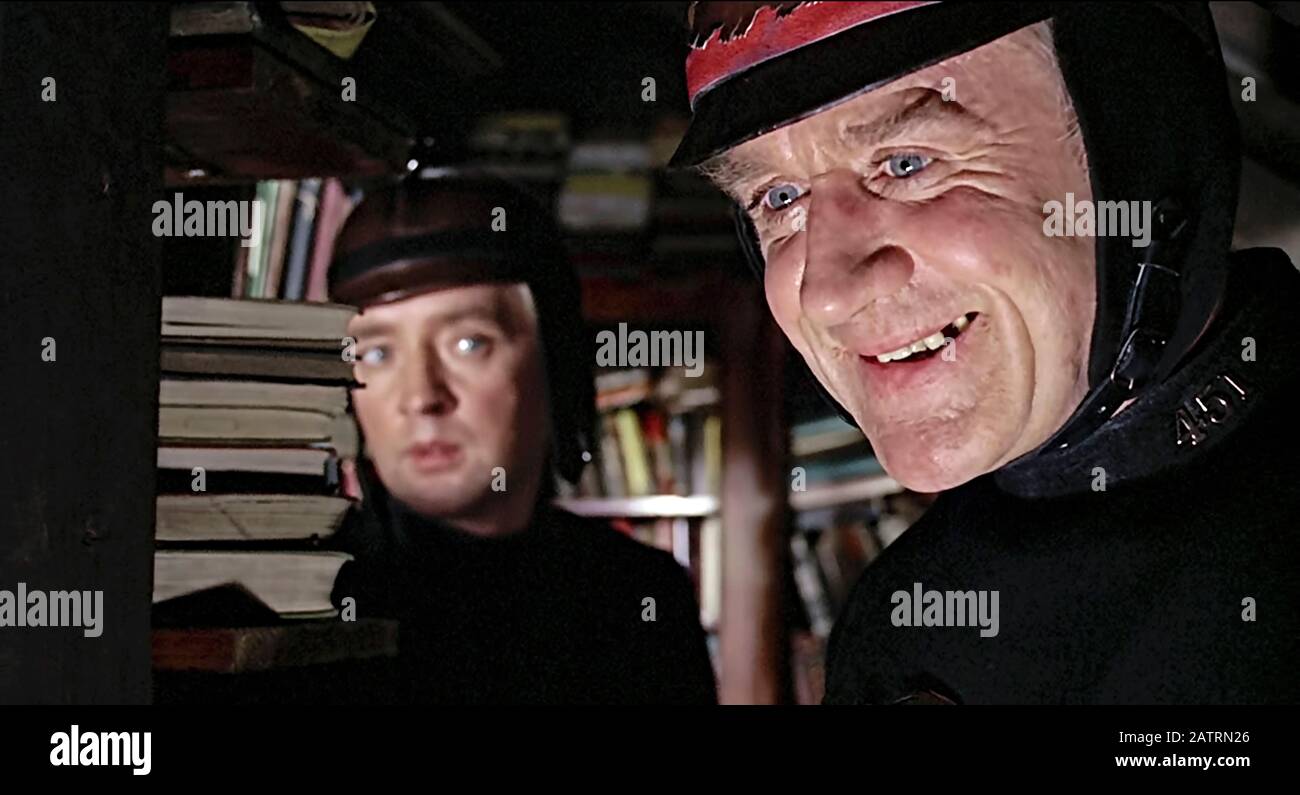Francois Truffaut's Fahrenheit 451 (1966) was a surprise to me. For years I thought it was supposed to be an successful adaptation of Ray Bradbury's classic 1953 novel- about a future society where books are banned and "firemen" burn them. When I saw it in the library I think I forgot it was even directed by Truffaut. But I wanted to see it because I knew it'd at least be interesting. What I found was actually a strong film in many ways. And the DVD making of documentary made me appreciate it more. This is an underrated gem from the 60s and a singular adaptation by Truffaut, bringing an European flavour to an American classic.
What makes the film European isn't merely having a French director but having an non-American cast, with a German actor in the lead role and Britons as his co-stars. Themes of fascism were always there in the novel but the film takes this further by visualizing the firemen in Nazi-esque all-black uniforms and its main character Guy Montag (Oskar Werner) having blonde hair. And as others have pointed out Montag even gives his boss Captain Beatty (Cyril Cusack) a salute similar to the Nazis. So yeah, this isn't a subtle metaphor.
The European flavour also extends to the film's overall atmosphere. It feels less like a Hollywood movie and more art-house. Having Julie Christie play both Montag's vapid wife Linda and his next door neighbor Clarisse, a school-teacher who awakens Montag's curiosity in reading, also feels more avant-garde than Hollywood. It was actually producer Lewis M. Allen's idea (he was the husband of screenwriter Jay Presson Allen). Truffaut didn't want Linda and Clarisse to have a villain/hero thing going on but to be two sides of the same coin.
Christie playing duel roles brings to mind Alfred Hitchcock's Vertigo. That film sees Kim Novak playing duel roles as well though technically it's one character playing a part. But the key similarity is the woman being the instigator of the protagonist's journey. And in both films the two women represent a choice. In Vertigo Scottie could choose the normal and nice life with Judy. Instead he wants the romanticized figure of Madeline. In Fahrenheit 451 Montag is given the choice between the monotonous but safe life with Linda or the more intellectually fulfilling but dangerous path with Clarisse. She is one of the "book people," radicals who memorize books to preserve them.
In the DVD documentary film historian Annette Insdorf calls this chapter of Truffaut's career his "Hitchcock period," where he delved extensively in to Hitchcock's work. His films around this time- The Soft Skin (1964), The Bride Wore Black (1968) and Mississippi Mermaid (1969) have gotten comparisons to Hitchcock's work. The documentary discuses how Truffaut used the "Vertigo Effect" in one scene, which is also called a dolly zoom. This is when the camera operator zooms in while dollying forwards or backwards.. There's also a dissolve which homages The Wrong Man (1956). Another Vertigo-esque sequence is Montag's dream after a woman burns down her because she won't leave her books. Montag later has a dream where he sees Clarisse in the woman's outfit. This brings to mind Scottie's dream where he sees Carlotta in the scene with him and Madeline's husband, Gavin Elster.

Werner based his performance on the idea of being robotic; he felt science fiction films demanded this kind of performance. But Truffaut wanted Werner to act like a a monkey discovering books for the first time, even going as far to sniff them. While Truffaut and Werner got along well when they made Jules and Jim Werner's ego got inflated after starring in Stanley Kramer's Ship of Fools, for which he received a Best Actor nomination. By the time he made Fahrenheit 451 I guess he thought himself above Truffaut. Regardless of Werner's ego I think his approach to the character makes sense. Montag should be a more reserved guy, someone who doesn't have felt much passion. When he begins to read he awakens his soul.
I want to talk a little bit more about Truffaut and what brought him to this project. Truffaut wasn't a science fiction fan and Insdorf, when she first saw the film, didn't know what to expect given Truffaut's previous films were all character dramas. Upon watching the film she realized it wasn't science fiction because Truffaut was more interested in the themes dealing with literature. I'd argue Truffaut stripped down a lot of the book's sci-fi and focused on the speculative aspect of the story. The production design isn't very futuristic but more vague and disparate in its elements. On the documentary it's discussed how the film combines the new and the old. Linda buys Montag a straight razor to replace his electric one, there are old phones and wall-screens. And as I said earlier the world of the film feels very insular. There's nothing grand about this future. If anything it all feels banal.
By the film's end Montag becomes one of the book people. Like the firemen they burn books but only after they've been memorized. They're protected in a person's mind and they refer to themselves by the book in their head. While they are defined by a book rather than personality traits they're more individuals than the rest of society. This is because they have something important about them which is the art they're preserving. The snow in the final scene where we see the book people walking around memorizing the books was happenstance. It makes the final image of these people incredibly poignant.
Fahrenheit 451 wasn't a box office or critical success. But I think it holds up pretty well nearly 60 years later and can be better appreciated for being a distinctive film in Truffaut's filmography. So, what's your favourite Truffaut film? And where does Fahrenheit 451 rank for you in his output. Comment and let me know.




No comments:
Post a Comment